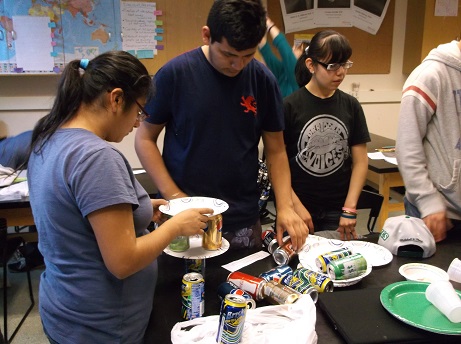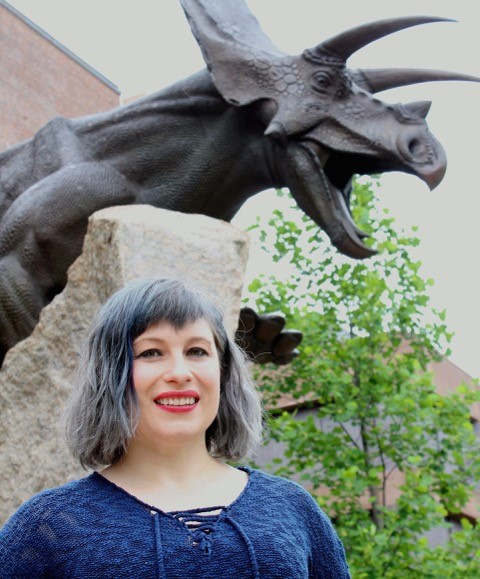Program Profiles
How do successful afterschool STEM programs do it?
These innovative afterschool programs offer impactful STEM programming to diverse populations. Read on to hear their advice for success and to learn about their program structure, evaluation results and partnership models.
Evolutions
The EVOLUTIONS After School Program (Evoking Learning and Understanding Through Investigations in the Natural Sciences) is housed at the Yale Peabody Museum of Natural History in New Haven, CT. The Museum’s mission is to serve Yale University by advancing our understanding of earth’s history through a) geological, biological and anthropological research; and b) communicating the results of this research to the widest possible audience through publication, exhibition and educational programs. The EVOLUTIONS program aligns with the institution’s mission through its goals to:
The EVOLUTIONS After School Program serves 100 students each year from New Haven and West Haven Public High Schools. Students may enroll beginning in Grade 9 and are encouraged to remain in the program through graduation. Weekly afterschool classes take place in the museum from October through May and the employment program runs on weekends and throughout the summer. Currently, 60% of EVOLUTIONS students are female;75% identify as Black or Latinx; 65% qualify for free/reduced lunch; and more than half will be first in their families to go to college.
All 100 participants (grades 9-12) enrolled in EVOLUTIONS attend a science and college-focused afterschool class one day per week. In Year 1, students learn about the museum, science careers, and communication. In Year 2 and 3 students work in groups to develop exhibits for the museum, and begin preparing for college, and in Year 4, students focus on the college application process. Throughout the year, EVOLUTIONS also hosts evening social events and SAT practice sessions, as well as a 3-day out-of-state college trip over spring break of each year.
After one year, EVOLUTIONS participants become eligible to apply to the Sci.CORPS program (Science Career Orientation and Readiness Program for Students). After volunteering for 75 hours and earning a series of museum competency badges, participants move into paid positions as museum interpreters. 35 students are currently working in Sci.CORPS. They typically work 15-20 hours per month.
Advanced Juniors and Seniors may also apply for the EVOLUTIONS Lab Internship program where they work alongside undergraduate mentors in the laboratories of Yale science faculty. These paid, 100 hour internships are offered to approximately 15 students each year.

The EVOLUTIONS program focuses on four key program goals:
The program bridges all four years of high school. In their first year, youth participate in weekly afterschool classes focused on exploration of STEM careers through tours, hands-on activities and field trips led by Yale undergraduate students and faculty. In their second and third years, students begin exploring college options, and learn to communicate science to the public through research and production an exhibition that is displayed in the museum for one year. The current exhibition, Ladies First, is a historical look at women in STEM, and the barriers faced by many women of color who were first in their fields.
SageFox consulting has worked with EVOLUTIONS for the past eight years. The evaluation plan consists of: Pre- and Post Student Surveys measure attitudes toward math, science and the environment, and increases in ability to carry out a variety of workplace and communication skills; Student and Staff Focus Groups provide the opportunities for participants to reflect on their experiences and offer suggestions for future years; and Parent Surveys , measuring the impact that Evolutions has on their children’s academic success, interest in higher education, and social development. SageFox found that in 2017, students reported significant increases in a variety of skill areas.
|
Area |
% Increased |
|
Knowledge of how the Peabody Museum works |
94% |
|
Understanding of how to create a museum exhibition |
93% |
|
Knowledge of museum related careers |
90% |
|
Personal engagement in learning science |
88% |
|
Understanding of the connection between high school academics, college academics, and careers |
87% |
|
Ability to work in teams |
85% |
|
Knowledge of science related careers |
85% |
|
Ability to conduct science |
82% |
|
Interest in the Peabody Museum collections |
82% |
|
Involvement in the community |
82% |
|
Science literacy |
81% |
|
Communication skills |
80% |
In addition, all 28 EVO graduates were accepted to college, with 26 students moving on to attend four-year universities. 6 of those students were accepted to Yale University.
EVOLUTIONS works with the New Haven and West Haven public school systems to offer students school credit for their successful participation in the program, and volunteer hours count toward school community service requirements. EVOLUTIONS is part of Yale’s Pathways to Science Project, which grants access to a network of other youth STEM opportunities around campus. Program alumni who attend local colleges will host workshops, campus tours and info sessions for EVOLUTIONS students a few times per year and offer advice about the college application process. College students also work alongside EVOLUTIONS lab interns, bridging the gap between faculty researchers and high school students.
All program funding and salaries come through grant and foundation support.

What feature of your program do you think has been most crucial for success?
In EVOLUTIONS, we focus on youth not only as recipients, but also as producers of knowledge. The exhibition project is one example of this; youth feel a tremendous sense of pride when they see their work displayed in a prestigious museum. Similarly, museum interpreters have regularly created opportunities to share their knowledge of science with museum visitors, and lab interns get to contribute to data for authentic scientific research. It is crucial that youth develop a sense of agency and ownership over their experiences, and that they have an opportunity to contribute to the discourses within the institution.
What were some of the challenges the program faced in its early stages?
Of course, buy-in is always a challenge, particularly in an institution that traditionally caters to the intellectually elite and depends heavily on well-educated adults for program implementation. The shift to using local youth took some adjustments. In addition, human resource issues have been a challenge. Youth jobs do not fit into the standard job descriptions of protocols of the university, so entirely new job categories had to be created to accommodate them.
What advice would you have for programs that want to integrate STEM?
Create opportunities for authentic experiences. Hands-on workshops are fun, but real learning happens when you can contribute to the construction of new ideas and make things that matter to others. Encourage social interactions with scientifically-minded people. Lectures and workshops can provide knowledge, but can also reinforce stereotypes. Youth need to learn that scientists are regular people who also watch TV and eat ice cream and wear jeans.
Are there any missteps that the program has made?
One mistake we made was believing that we, as an institution, had important things to offer the community, without recognizing that the community could in turn contribute skills, knowledge and power to improve the institution. I think that the most successful programs do not try to change youth so that they fit into the norms of the institution, but rather are willing to adjust the norms of the institution to recognize the talents and skills that youth already possess.